Our research interests
Secondary metabolites derived from natural medicinal resources are positioned as an attractive compound group for drug innovation seeds. In fact, 25% of pharmaceuticals utilized in clinical settings are currently either secondary metabolites derived from natural medicinal resources or derivatives that have been synthesized using these. In particular, marine invertebrate such as marine sponge as well as marine-derived microorganisms inhabit a unique environment that differs from the land, and as they utilize a metabolic pathway that differs from that used by medicinal plants and terrestrial microorganisms, they produce secondary metabolites that have a novel chemical structure.
We are mainly using marine medicinal resources as our exploratory resources in research designed to discover novel medicinal seeds and develop novel drug targets for a wide range of intractable diseases.
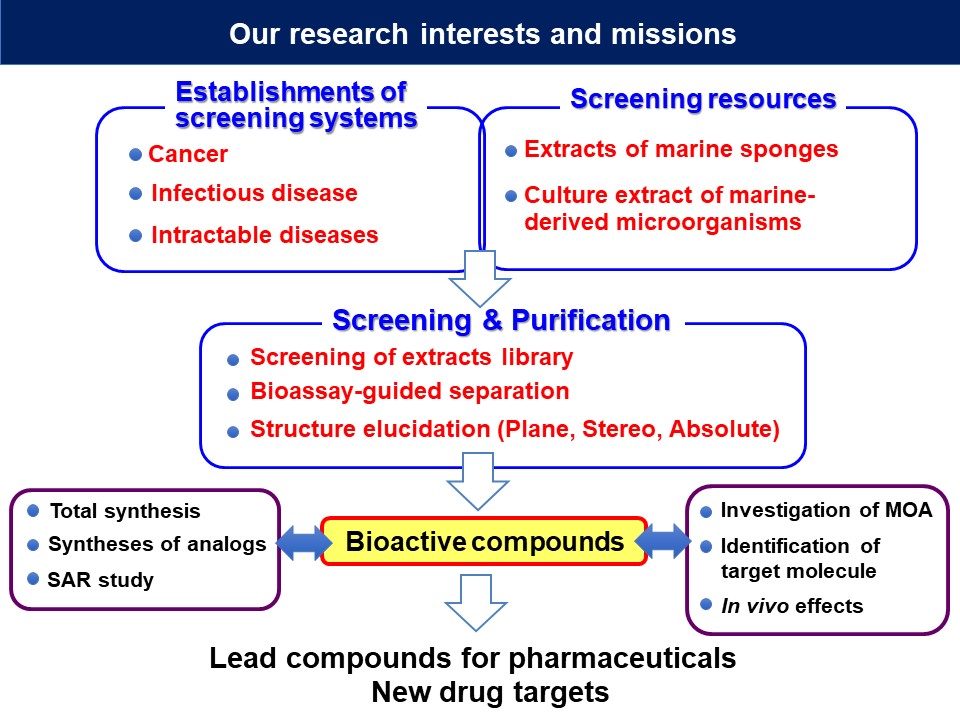
Research subjects
1)Establishment of a marine medicinal resource library
In cooperation with an Indonesian university and institute, we are preparing extracts of marine sponges and culture extracts derived from marine microorganisms and we are establishing a library of these substances. In addition, in cooperation with universities and laboratories in Brunei and Vietnam, we have recently begun joint research into natural medicinal resources. In addition, in order to increase the diversity of the compounds included in the culture extracts of marine microorganisms, we are studying methods of activating dormant genes of secondary metabolites that remain unexpressed under normal cultivation conditions.
2) Establishment of a novel screening system for the purpose of exploration of new medicinal seeds and Exploration of new medicinal seeds derived from marine medicinal resources
Researchers around the world are engaged in research designed to analyze the pathophysiologies of a variety of diseases, and their results have been reported in academic papers as well as domestic and international academic conference presentations. We are constantly incorporating into our research the latest information and using this to establish screening systems for the purpose of exploring new medicinal seeds that are effective on a wide range of intractable diseases, including cancer and infectious diseases. We are exploring new medicinal seeds using our unique marine medicinal resource library.
3)Analysis of the mechanism of action and the target molecules of bioactive natural products
In order to develop the bioactive natural products that we discover into drug lead, it is necessary to elucidate their mechanisms of action and identify their target molecules (binding proteins). Our target molecule analysis also serves as important research that will lead to create novel drug targets. We fully utilize the methods of biology, biochemistry, molecular biochemistry, chemical biology, and chemical genetics to analyze the mechanisms of action and target molecules of the bioactive natural products that we discover.
4)Total synthesis of bioactive natural products, structure-activity relationship study using synthetic analogs and creation of lead compounds
Many of the bioactive natural products that we discover in our exploratory research are in extremely small amounts, and therefore, in order to provide compounds in sufficient amounts, it is necessary to use power of organic synthesis. We perform total synthesis in order to ensure that we can provide the bioactive natural products that we discover in large amounts, and in order to develop the bioactive natural products that we discover into lead compounds, we are performing analog synthesis and structure-activity relationship study.
Research organization
In our laboratory, we have divided our research into an exploratory group and a synthesis group. These groups are in cooperation as they conduct experiments daily in order to achieve our research goals. The students who graduate from our laboratory possess the latest knowledge and skills in organic chemistry, biochemistry, and molecular biochemistry. We provide them with guidance and training in the hope that they will be active at the forefront of global research in these fields.
Not all of our work is enjoyable. However, the students grow as they overcome each obstacle that arises. We welcome hardy students who enjoy conducting experiments, who are interested in drug discovery using natural products, and who can work together with us in these endeavors.
<Exploratory group>
The exploratory group is engaged in the construction of new screening systems for the purpose of exploring novel medicinal seeds and, using this system, they are performing exploratory research into bioactive natural products. From extracts of marine sponges and culture extracts derived from marine microorganisms, they are targeting biological activities and are engaged in the isolation of compounds and determining their chemical structure through the use of nuclear magnetic resonance (NMR) and other forms of analysis.
The bioactive natural products that we discover are subjected to biological, biochemical, molecular biochemical, chemical biological, and chemical genetic methods in order to identify their mechanisms of action and their molecular targets. In addition, in vivo experiments are conducted on animals using compounds that are expected to be developed into medicinal seeds.
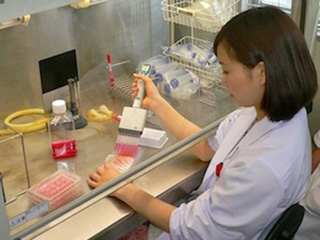
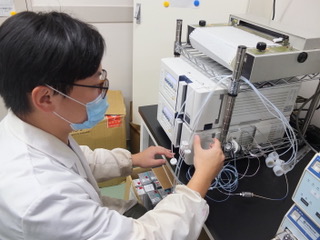
<Synthesis group>
Many of the bioactive natural products discovered by the exploratory group exist in extremely small amounts, and therefore, it is necessary to perform organic synthesis in order to provide compounds. The synthesis group utilizes the latest in synthetic organic chemistry to perform total synthesis on the bioactive natural products discovered by the exploratory group, analyze the structure-activity relationship using synthesis research of analogs, and conducts research designed to produce useful drug leads. In order to identify the target molecules of the bioactive natural products that have been discovered, they synthesize probe molecules derived from the bioactive natural products and identify the target proteins.
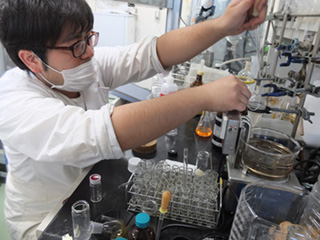
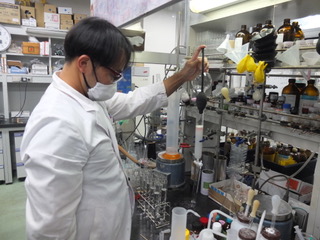
Life as a researcher
Students are assigned to either the exploratory group or the synthesis group according to their wishes. Based on the guidance they receive from the instructors in charge of each group and from senior students, they perform experiments related to the research projects they have been assigned, through which they spend most of their time obtaining knowledge and skills in organic chemistry, natural products chemistry, biochemistry, and molecular biology. Through participation in regular research reports (colloquiums) and seminars, they steadily advance in their research activities and at the same time acquire the skills required to give presentations of their work.
<Group meetings>
Approximately every two weeks each group meets. During these meetings, they report on the progress and future plans related to their research and engage in discussions with all participants. By engaging in intense discussions of raw experimental data, they reveal issues that they had not previously noticed, which leads to new ideas.
<Colloquiums>
Colloquiums are meetings at which reports on each person’s research results are announced before all the members of the laboratory in a setting that mimics that of academic conferences. Through the process of compiling their research results and devising ways of describing these results in a way that is understandable to people who are unfamiliar with the material, the students develop the presentation skills required to perform as professionals in the field.
<Seminars>
The seminars are meetings during which participants study the latest research reports on issues being investigated in the laboratory and describe these to everyone in the laboratory. The seminars are not only places where students obtain the latest knowledge related to their research issues and develop presentation skills. The seminars are also designed to provide them with opportunities to improve their ability to read and understand English-language materials and learn how to write their own research reports.
<Presentations at academic conferences>
Academic conferences are not only places where participants present the results of their own research. They also serve as venues where participants receive stimulation that can help them conduct their research. This stimulation takes the form of discussions with other participants and forming increasingly large circles of colleagues through interaction and information exchange with other participants. The students in our laboratory who have progressed in their research are encouraged to actively participate in academic conferences, regardless of what year of study they are in or whether the conferences are held in Japan or abroad, in order to provide them with opportunities to present their research results.





